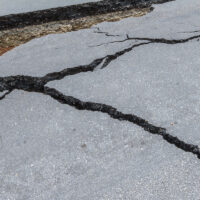New York Court Says No Liability for Village of Lake George Sidewalk Slip and Fall Without Written Notice of Defect: City of New York Law is Different

In July 2011 Virginia Koch was walking down an asphalt sidewalk in the New York Village of Lake George when she tripped and fell on an uneven, sunken portion of the sidewalk. She sued the Village for her injuries, and the municipality responded with a motion for summary judgment to dismiss the case on the grounds that the Village did not have prior notice of the sidewalk defect. The court granted this motion and dismissed the complaint in the case of Koch v. Village of Lake George.
Lake George has enacted what is known as a prior written notice statute. This law, Lake George Village Code Chapter 186, clearly states:
“No civil action shall be maintained against the Village for damages or injuries to person or property sustained in consequence of any…sidewalk…being defective, out of repair, unsafe, dangerous or obstructed by overgrown vegetation or otherwise…unless written notice of the defective, unsafe, dangerous or obstructed condition…was actually given to the Village Clerk and there was a failure or neglect within a reasonable time after the receipt of such notice to repair or remove the defect, danger or obstruction complained of…or the place otherwise made reasonably safe.”
Constructive Notice Not Sufficient
Even though actual notice had not been provided, the plaintiff tried to show that the Village had constructive notice of the dangerous condition, meaning city officials should have known about the condition, even though they weren’t given written notice. However, the court responded that it is well-settled law that where a municipality has enacted a prior written notice statute, it cannot be held liable unless such notice was actually given.
Exceptions to Notice Requirement Don’t Apply
There are two exceptions to the notice requirement, which are applicable when the municipality created the defect through its own affirmative negligence, or when some special use of the property has conferred a special benefit on the municipality.
In this case, the plaintiff tried to show that the Village was negligent in using inferior material to pave the sidewalk, in violation of the Village Code. The plaintiff also had an expert witness submit an affidavit on the uses and applications of asphalt in sidewalk construction.
Unfortunately, the judge did not feel that the plaintiff backed up her arguments with sufficient evidence. For instance, she didn’t cite a specific code provision that was violated, and her expert did not testify that the surfacing created an immediate defect or dangerous condition. To the contrary, the expert’s opinion was that water, ice, snow and use caused the sidewalk to buckle and break. In order to hold the Village liable for negligence, it would have had to create an immediate defect or dangerous condition by its actions.
NOTE: New York City’s Sidewalk Law Is Different
This accident occurred in upstate New York, but the case may have gone differently had it occurred in New York City. Some years ago, NYC amended its Administrative Code (section 7-210) to shift the responsibility for maintaining sidewalks from the City to the property owner whose property abuts the sidewalk (see Who Owns the Sidewalk?, posted March 20, 2014). The City only retains responsibility in the limited case of owner-occupied one-, two- or three-family residential real property that is used exclusively for residential purposes. Other property owners are liable for sidewalk injuries if they had actual or constructive notice of the danger, or if they created the condition or enjoyed some special use from the sidewalk.
This is a complicated area of the law, and your right to recover compensation can be jeopardized if you do not follow the proper set of procedures that apply to your case. Make sure you contact an attorney knowledgeable in New York City sidewalk accident cases if you have been injured in a slip and fall or trip and fall accident on a sidewalk in New York City.
